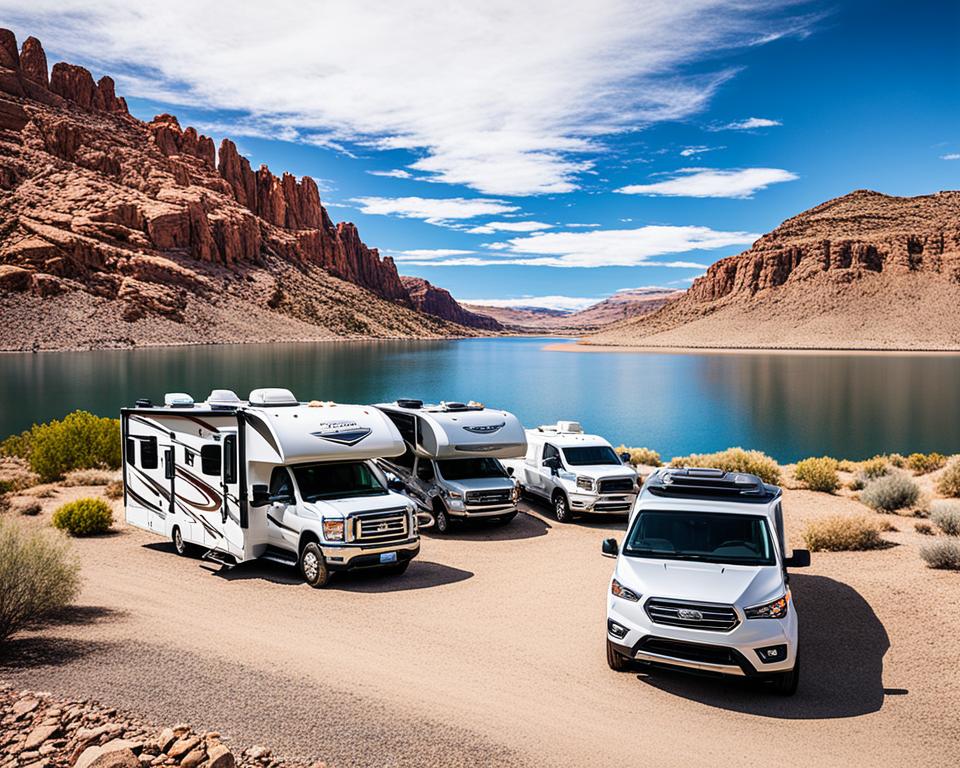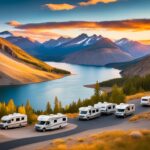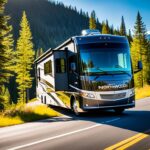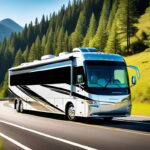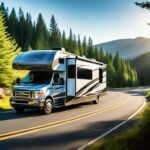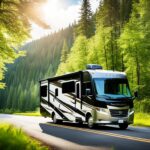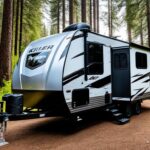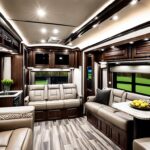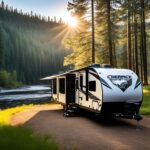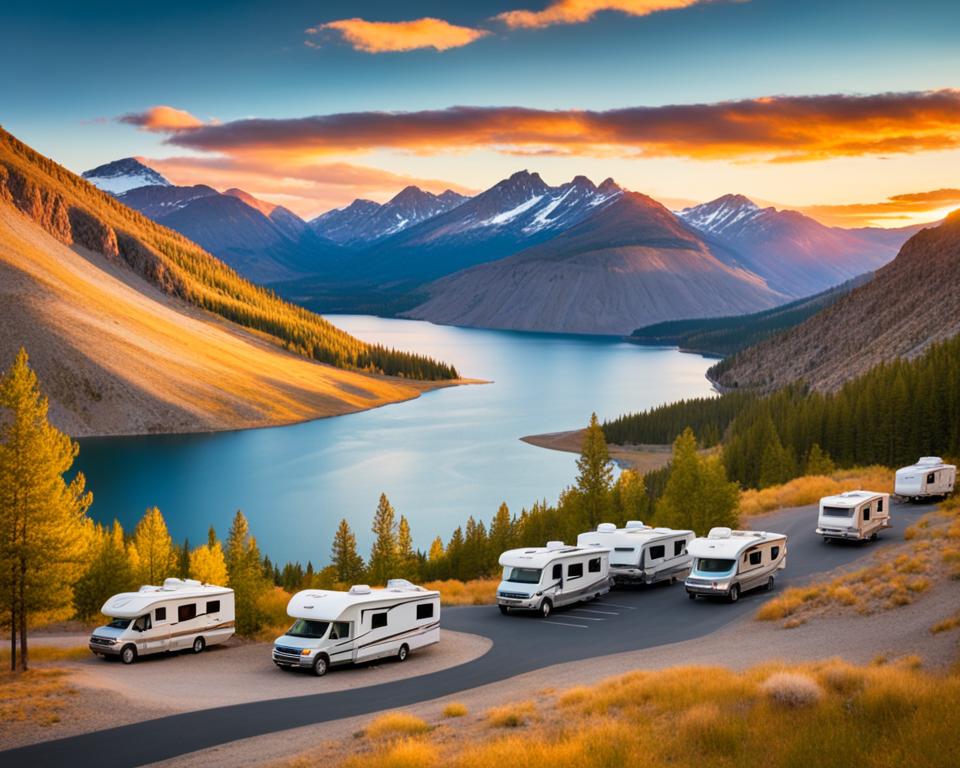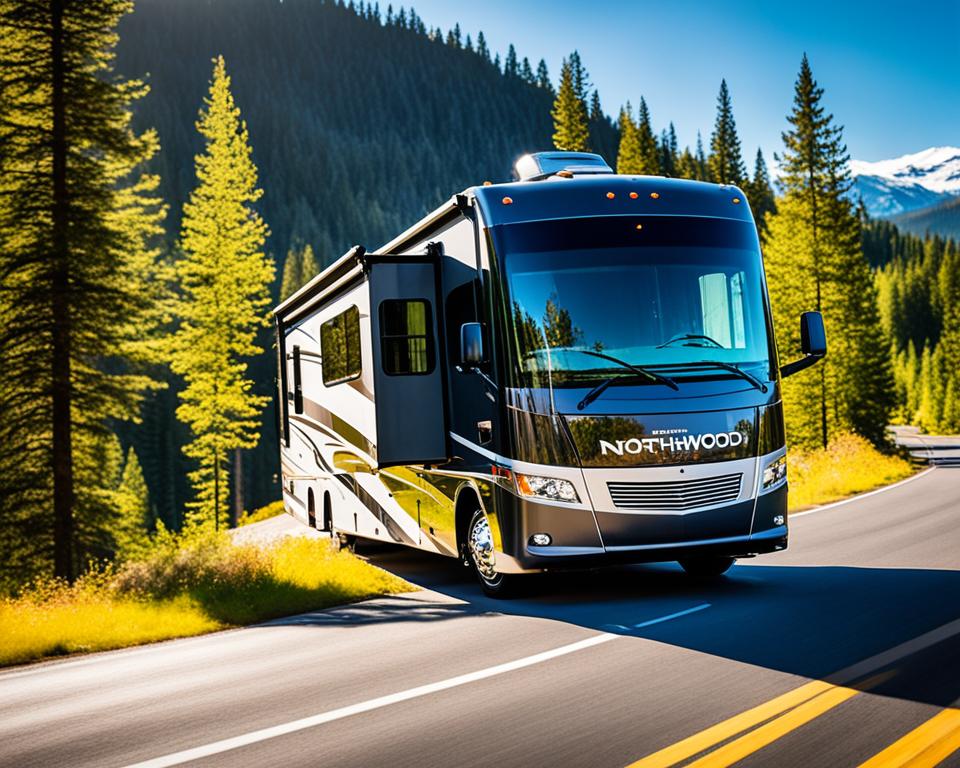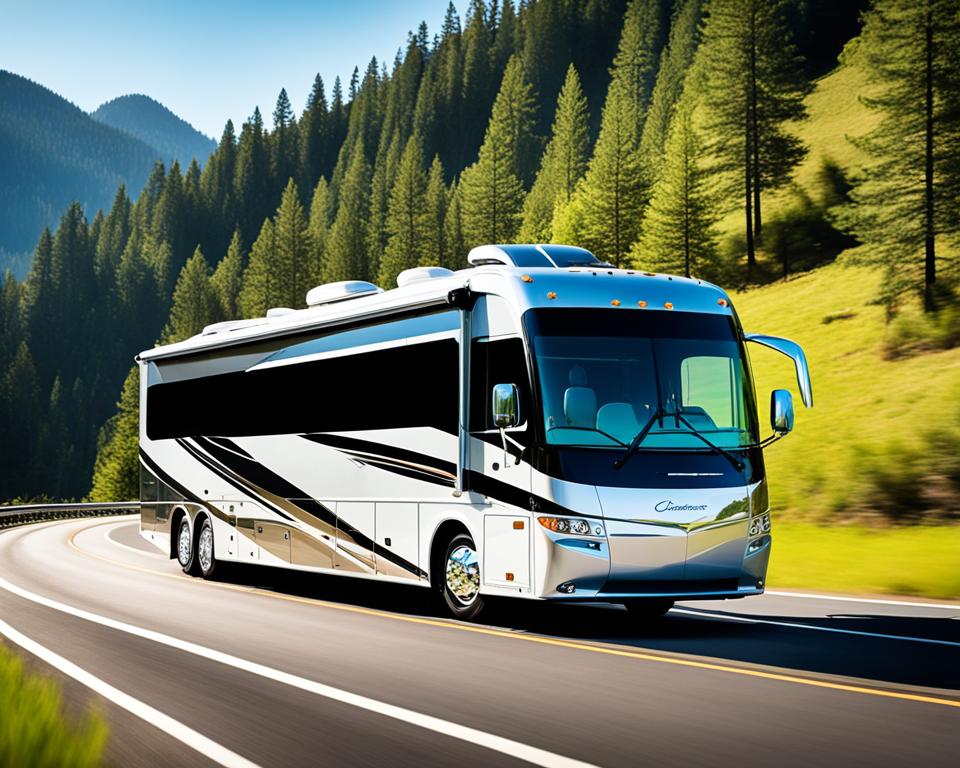A recreational vehicle (RV) is a motor vehicle or trailer that includes living quarters designed for accommodation. This versatile vehicle combines transportation and living quarters, allowing people to enjoy the comforts of home while traveling.
Types of RVs include motorhomes, campervans, coaches, caravans, fifth-wheel trailers, popup campers, and truck campers. RVs can range from utilitarian to luxurious, with features like kitchens, bathrooms, and multiple beds. They can either be trailers towed behind vehicles or self-propelled vehicles.
- A recreational vehicle (RV) is a motor vehicle or trailer that includes living quarters designed for accommodation.
- RVs offer the comforts of home while traveling, combining transportation and living quarters.
- Types of RVs include motorhomes, campervans, coaches, caravans, fifth-wheel trailers, popup campers, and truck campers.
- RVs can range from utilitarian to luxurious, with features like kitchens, bathrooms, and multiple beds.
- RVs can either be trailers towed behind vehicles or self-propelled vehicles.
The History of Recreational Vehicles
The history of recreational vehicles can be traced back centuries, with the evolution of RVs shaped by innovation, necessity, and the desire for adventure. From humble beginnings as basic sleeping accommodations to the luxurious and technologically advanced vehicles we see today, RVs have come a long way.
In the 18th century, travelers relied on wagons and horse-drawn carriages for transportation and basic shelter. These early vehicles provided a place to rest during long journeys, laying the foundation for what would become recreational vehicles.
As the 19th century brought motorized cars, the concept of RVs started to take shape. Custom-built “auto campers” emerged, offering more comfortable sleeping arrangements and amenities. These early pioneers in RV development paved the way for the modern RV lifestyle.
In the early 20th century, towable trailers became popular, allowing for more flexibility and convenience in travel. RV clubs emerged, promoting the community and camaraderie of the RV lifestyle. This period marked a significant milestone in the history of recreational vehicles.
The 1960s and 1970s witnessed a surge in luxury and innovation in the RV industry. Motorhomes, such as Class A, B, and C, were introduced, offering spacious interiors and a home-away-from-home experience. These new classes of motorhomes attracted a wide range of travelers, from families to retirees, and further solidified the appeal of RV travel.
As we entered the 21st century, RVs underwent further advancements to meet the changing needs of travelers. Eco-friendly and sustainable features were integrated into RV designs, catering to the growing demand for environmentally conscious travel options. The technological advancements in RVs included smart home features, energy-efficient appliances, and enhanced connectivity, ensuring a comfortable and connected travel experience.
The history of recreational vehicles is a testament to human ingenuity and the pursuit of adventure. From the early pioneers who created basic sleeping accommodations to the present-day RV enthusiasts who travel in style and comfort, the evolution of RVs continues to shape the way we explore the world.
Types of Recreational Vehicles
Recreational vehicles come in various types to suit different travel preferences. Whether you prefer a self-contained motorhome, a towable travel trailer, or a compact campervan, there’s an RV that fits your needs. Let’s explore the different types of recreational vehicles:
Motorhomes
Motorhomes are fully self-contained vehicles with built-in living quarters. They provide the ultimate convenience and freedom for travelers. Here are the three main classes of motorhomes:
- Class A Motorhomes: These are the largest and most luxurious motorhomes, resembling traditional buses. They offer spacious interiors, full amenities, and ample storage.
- Class B Motorhomes: Also known as camper vans, these compact and versatile vehicles are perfect for couples or small families. They offer a comfortable living space in a compact package.
- Class C Motorhomes: These motorhomes are built on a truck chassis and have a distinctive cab-over design. They provide a good balance of space, features, and maneuverability.
Travel Trailers
Travel trailers are towable units that can be easily unhitched from the towing vehicle. They offer a wide range of sizes and floor plans to accommodate different needs. Here are some popular types of travel trailers:
- Fifth Wheel Trailers: These luxurious and spacious trailers are designed to be towed by pickup trucks with a special hitch in the truck bed. They often feature multiple bedrooms, large living areas, and high-end amenities.
- Popup Campers: Also known as tent trailers, these compact and lightweight trailers are collapsible for easy towing and storage. They offer the convenience of a trailer and the simplicity of tent camping.
Campervans
Campervans are compact and versatile vehicles that provide a convenient way to travel. They are smaller than motorhomes but still offer many of the necessary amenities. Campervans are a popular choice for solo travelers, couples, or small families who value mobility and flexibility.
Truck Campers
Truck campers are compact living spaces that can be loaded onto pickup trucks. They are an excellent option for outdoor enthusiasts who want to explore remote areas or go off-grid. Truck campers offer a cozy and efficient living space with all the essentials.
Each type of recreational vehicle has its own unique features and benefits. Whether you’re looking for luxury and comfort or simplicity and flexibility, there’s an RV that perfectly suits your travel style.
Features of Recreational Vehicles
Recreational vehicles (RVs) offer a wide range of features and amenities that enhance the travel experience. Whether you’re embarking on a short weekend getaway or a long-term adventure, RVs are designed to provide comfort, convenience, and the comforts of home on the road.
Here are some of the standout features commonly found in RVs:
- Kitchens: RVs are equipped with fully-functional kitchens that include appliances like stoves, refrigerators, microwaves, and sinks. This allows travelers to prepare and enjoy their favorite meals while on the go.
- Bathrooms: RVs typically have bathrooms with toilets, showers, and sinks. These facilities provide the convenience of a private restroom, eliminating the need for public facilities.
- Sleeping Areas: RVs come with designated sleeping areas that boast multiple beds, ensuring a comfortable night’s sleep for everyone on board. Whether it’s a cozy bunk bed or a spacious master bedroom, RVs cater to various sleeping preferences.
- Storage Spaces: RVs are designed with ample storage spaces to accommodate belongings and travel essentials. From closets and cabinets to storage compartments and under-bed storage, RVs offer plenty of room to organize and stow away personal items.
- Air Conditioning: Many RVs are equipped with air conditioning systems to keep the interior temperature comfortable, especially during hot summer months.
- Televisions and Entertainment: RVs often feature televisions and entertainment systems, providing entertainment options while on the road. This can include built-in TVs, DVD players, and even satellite receivers for accessing a wide range of channels.
- Quartz Countertops: Some luxury RV models boast high-end finishes, such as quartz countertops, adding a touch of elegance to the kitchen and bathroom areas.
In addition to these features, RVs may have expandable sides or canopies that create a more spacious living area when parked, allowing travelers to fully enjoy their surroundings. The specific amenities and features of an RV can vary depending on the type and model chosen.
Quote:
“RVs provide travelers with the freedom to explore the world while enjoying the comforts of home. With well-appointed kitchens, cozy sleeping areas, and convenient storage spaces, RVs offer a comfortable and enjoyable travel experience.”
As you can see, recreational vehicles provide all the amenities needed to make your travel experience as comfortable and convenient as possible. Whether you’re cooking a delicious meal in the kitchen, relaxing in the cozy sleeping area, or admiring the beautiful quartz countertops, RVs truly bring the comforts of home wherever you go.
Next, let’s explore the numerous benefits of owning a recreational vehicle and how it can enhance your travel adventures.
Benefits of Owning a Recreational Vehicle
Owning a recreational vehicle (RV) offers a multitude of advantages for travel enthusiasts. Whether you’re a nature lover, an adventure seeker, or a family looking for quality time together, RV travel provides an unparalleled experience. Here are some key benefits of owning an RV:
1. Flexibility and Spontaneity
An RV allows you to embark on flexible and spontaneous getaways. With the freedom to travel at your own pace and choose your destinations, you can explore different landscapes, national parks, and hidden gems. Whether it’s a last-minute weekend trip or an extended cross-country adventure, RV travel provides the ultimate flexibility.
2. Connection with Nature
RV travel enables you to establish a deep connection with nature. Wake up to the sight of majestic mountains, enjoy breathtaking sunsets by the ocean, or camp amidst lush forests. Embrace the serenity and tranquility of natural surroundings, creating unforgettable memories and experiences along the way.
3. Comfort and Convenience
RVs offer the comforts of home while on the road. With well-equipped kitchens, cozy sleeping quarters, and functional bathrooms, you’ll have all the necessary amenities at your fingertips. Enjoy home-cooked meals, restful nights, and the convenience of having everything you need on board.
4. Cost-Effective Travel
Owning an RV can lead to significant cost savings compared to traditional travel. With an RV, you eliminate accommodation expenses, as your RV becomes your home away from home. Additionally, you can save on dining expenses by preparing meals in your own kitchen. Over time, these savings can add up, allowing you to explore more destinations within your budget.
5. Quality Time with Family and Friends
An RV brings people together and provides the perfect setting for quality time with family and friends. Whether it’s gathering around a campfire, enjoying outdoor activities, or simply bonding during the journey, RV travel fosters strong connections and cherished memories that will last a lifetime.
| Benefits of Owning an RV | Description |
|---|---|
| Flexibility and Spontaneity | Embark on flexible and spontaneous getaways, traveling at your own pace and choosing your destinations. |
| Connection with Nature | Establish a deep connection with nature by immersing yourself in breathtaking landscapes and natural environments. |
| Comfort and Convenience | Enjoy the comforts of home on the road, with well-equipped kitchens, cozy sleeping quarters, and functional bathrooms. |
| Cost-Effective Travel | Save on accommodation and dining expenses, as your RV becomes your own mobile home and kitchen. |
| Quality Time with Family and Friends | Create lasting memories and strong connections while enjoying quality time with loved ones. |
“Owning an RV opens up a world of possibilities, enabling you to explore the great outdoors while enjoying the comforts of home.” – RV enthusiast
Whether you’re embarking on a weekend getaway, a cross-country road trip, or a long-term adventure, owning an RV unlocks exciting opportunities for travel, exploration, and creating cherished memories. Experience the many benefits of RV travel and embrace the incredible journey that awaits you.
Cost of Recreational Vehicles
When it comes to the cost of recreational vehicles (RVs), there is a wide range of prices depending on various factors. The type, size, and features of the RV play a significant role in determining its price. Here is an overview of the average price ranges for different types of RVs:
- Motorhomes: Motorhomes are known for their luxury and all-in-one design, which makes them the most expensive option. Prices for motorhomes typically range from $60,000 to $500,000 or more for high-end luxury models.
- Travel Trailers and Campervans: Travel trailers and campervans are more affordable options compared to motorhomes. Prices for these types of RVs generally range from $10,000 to $70,000, depending on the size, brand, and features.
- Fifth-Wheel Trailers, Popup Campers, and Truck Campers: These types of towable RVs offer a good balance between affordability and functionality. Prices for fifth-wheel trailers, popup campers, and truck campers typically fall within the range of $8,000 to $40,000.
It’s important to note that these price ranges are just estimates and can vary based on factors such as brand, condition, and additional customization. Before purchasing an RV, it’s essential to consider not only the initial cost but also ongoing expenses like maintenance and operating costs.
To give you a better idea of the price range for RVs, here is a comprehensive table summarizing the average costs:
| RV Type | Price Range |
|---|---|
| Motorhomes | $60,000 – $500,000+ |
| Travel Trailers and Campervans | $10,000 – $70,000 |
| Fifth-Wheel Trailers, Popup Campers, and Truck Campers | $8,000 – $40,000 |
Keep in mind that these prices may vary based on factors like the brand, model, age, and condition of the RV. Additionally, customizations and optional features can also influence the overall cost.
When budgeting for an RV, it’s crucial to consider not only the upfront cost but also ongoing expenses such as maintenance, insurance, fuel, and campground fees. By factoring in all of these aspects, you can make an informed decision and ensure that the cost of owning an RV fits within your budget.
Who Is a Recreational Vehicle Best For
Recreational vehicles (RVs) cater to a diverse range of individuals and families, offering a unique way to travel and explore the world. Whether you have a specific lifestyle or travel preference, there’s an RV that suits your needs. Here are some groups of people who can benefit from the RV lifestyle:
- Retirees: RVs are popular among retirees looking to embark on new adventures and explore different destinations. With the freedom to travel at their own pace and the comfort of home on the road, retirees can fully embrace their retirement years.
- Families: RVs provide an excellent option for families, allowing them to travel together comfortably and conveniently. With ample sleeping space, kitchens, and bathrooms, RVs make family trips more enjoyable and memorable.
- Adventure Seekers: Outdoor enthusiasts who enjoy activities like camping, hiking, and fishing find RVs to be the perfect companion for their trips. Having an RV allows them to have their equipment with them and explore various natural landscapes.
- Digital Nomads and Long-Term Travelers: Those who desire a mobile home while working or exploring different locations can benefit greatly from owning an RV. It provides the freedom and flexibility to stay connected while on the move.
Ultimately, RVs are best for individuals and families who value freedom, flexibility, and the ability to create their own travel experiences. Whether you want to relax and unwind or seek thrilling adventures, the RV lifestyle offers a unique way to make lasting memories.
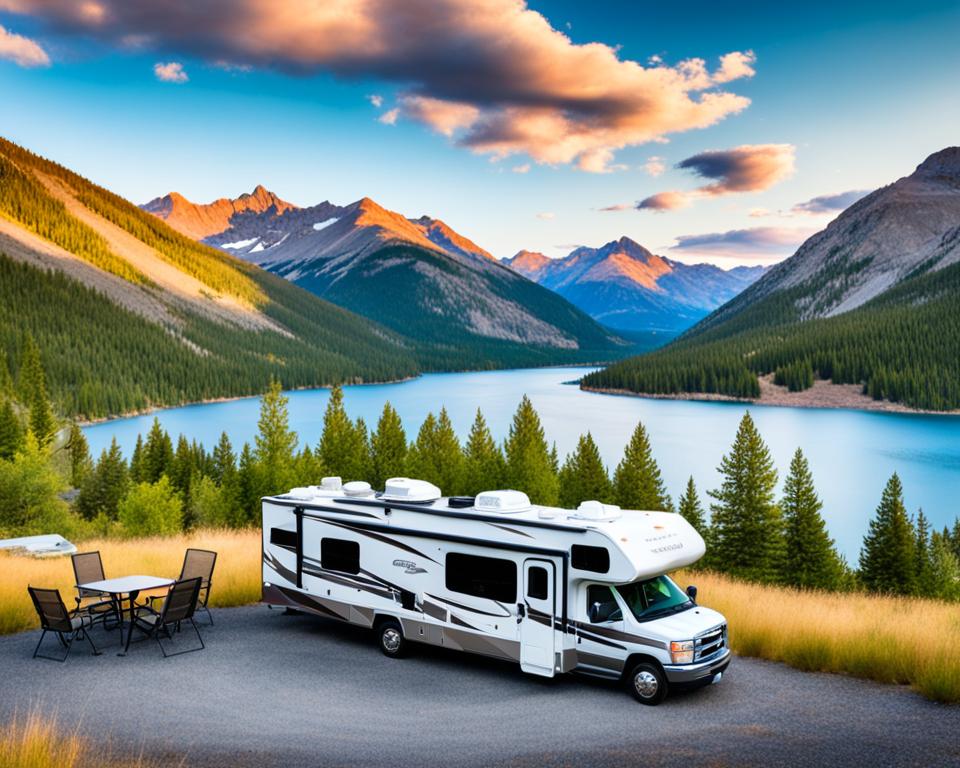
Life Expectancy of Recreational Vehicles
The life expectancy of a recreational vehicle can vary depending on factors such as maintenance, usage, and quality of construction. Well-maintained RVs have the potential to last for many years, with some surpassing a lifespan of 20 years. However, it is crucial to note that regular maintenance and repairs are essential to ensure the longevity of an RV.
The components of an RV, such as the engine, transmission, and electrical systems, may require occasional repair or replacement over time. By conducting regular inspections, servicing, and practicing proper storage, owners can significantly extend the life of their RVs. These proactive measures help prevent issues from escalating and preserve the overall functionality and safety of the vehicle.
When it comes to maintenance, it’s vital to follow the manufacturer’s recommendations and adhere to a routine maintenance schedule. Regular checks and servicing of vital systems, including the engine, brakes, tires, and electrical systems, can identify potential problems early on and rectify them promptly. This proactive approach can save owners from costly repairs and potentially hazardous situations down the road.
Proper storage is another key aspect of RV maintenance that contributes to its longevity. Storing the vehicle in a well-protected, climate-controlled environment, such as a dedicated RV storage facility or covered parking, helps shield it from harsh weather conditions, moisture, and UV damage. Additionally, using protective covers for the exterior and maintaining a clean interior can prevent wear and tear, preserving the aesthetics and functionality of the RV.
Benefits of Regular RV Maintenance:
- Extends the life of the RV
- Minimizes the risk of breakdowns
- Optimizes performance and fuel efficiency
- Safeguards against major repairs and expenses
- Preserves the resale value
In summary, the life expectancy of an RV is influenced by maintenance practices, frequency of usage, and the quality of its construction. With proper care, regular inspections, and timely repairs, RV owners can enjoy the longevity of their recreational vehicles, ensuring many years of travel and adventure.
| Factors Affecting RV Life Expectancy | Recommended Maintenance Practices |
|---|---|
| Maintenance | Follow manufacturer’s recommendations and adhere to a routine maintenance schedule for inspections, servicing, and repairs. |
| Usage | Avoid excessive wear and tear by practicing responsible driving, avoiding overloading the vehicle, and being mindful of weight limits. Use the RV regularly to prevent mechanical issues caused by prolonged inactivity. |
| Construction Quality | Choose an RV from a reputable manufacturer known for producing durable and well-built vehicles. |
| Storage | Store the RV in a climate-controlled, well-protected environment, using covers and maintaining cleanliness to prevent damage from elements and pests. |
Driving a Recreational Vehicle
Driving a recreational vehicle requires some considerations and, in some cases, a special license. For smaller RVs like campervans or travel trailers, a regular driver’s license is usually sufficient. However, larger motorhomes may require a special license, depending on their weight and length. It’s important to check the specific regulations in your state or country regarding RV driving requirements.
Additionally, driving an RV can be different from driving a regular car and may require some adjustment. The size and weight of an RV can affect its handling and maneuverability, especially in tight spaces or adverse weather conditions. It’s crucial to practice driving an RV before embarking on a long journey and become familiar with its unique characteristics.
Proper training can help new RV drivers gain confidence and develop the necessary skills to handle their vehicle safely. Many RV manufacturers offer training programs or classes to educate drivers about RV-specific driving techniques and safety precautions. These resources cover topics such as turning, parking, backing up, and managing blind spots.
Here are some essential tips for driving an RV:
- Be aware of height and weight restrictions on roads, bridges, and tunnels.
- Maintain a safe following distance and adjust your speed to account for the increased weight and size of the RV.
- Use your mirrors frequently to monitor the road and surrounding traffic.
- Practice parking and backing up in empty lots or designated RV parks.
- Plan your route in advance, considering road conditions and RV-friendly stops.
- Take breaks regularly to rest and prevent fatigue.
By following these guidelines and continuously improving your driving skills, you can enjoy a safe and enjoyable experience while driving a recreational vehicle.
RV Driving Safety Tips
“Driving an RV can be a thrilling adventure, but it’s important to prioritize safety. Take your time to adapt to the size and handling of the vehicle and always be cautious on the road.”
– Emily Johnson, RV Travel Expert
Special License Requirements for RVs
In some states or countries, operating an RV may require a special license, typically referred to as a Commercial Driver’s License (CDL) or a Non-Commercial Class B License. These licenses are necessary if the RV exceeds specific weight thresholds or falls into certain vehicle classifications. The requirements can vary, so it’s crucial to check with the local Department of Motor Vehicles (DMV) or licensing authority to determine if a special license is necessary based on your RV’s characteristics.
| RV Type | Weight and Length Thresholds | Licensing Requirements |
|---|---|---|
| Campervans or Travel Trailers | N/A | Regular Driver’s License (Class C or equivalent) |
| Motorhomes | Depends on weight and length regulations per state or country | Regular Driver’s License (Class C) or Commercial Driver’s License (CDL) – varies |
Conclusion
Recreational vehicles (RVs) offer a unique and exciting way to travel, providing the comforts of home on the open road. Whether you’re a retiree seeking new adventures, a family looking for quality time together, or an outdoor enthusiast yearning for the freedom of the great outdoors, there is an RV that suits your needs. With a variety of amenities, flexibility, and the ability to create personalized travel experiences, RVs have become a popular choice for leisure travel.
From motorhomes to travel trailers, RVs cater to different lifestyles and preferences. They provide a home-away-from-home experience, allowing you to explore the world in comfort and style. Whether you’re embarking on cross-country road trips, visiting national parks, or simply escaping to a peaceful campground, RV travel offers endless opportunities for adventure and discovery.
By embracing the RV lifestyle, you can enjoy the freedom to travel at your own pace, dictate your own journey, and create lifelong memories. From cooking delicious meals in your fully-equipped kitchen to relaxing in your cozy sleeping quarters, RVs ensure that you have everything you need for a convenient and enjoyable travel experience. Embrace the spirit of adventure and embark on your own RV journey today!
FAQ
What is considered a recreational vehicle?
A recreational vehicle (RV) is a motor vehicle or trailer that includes living quarters designed for accommodation.
What are the types of recreational vehicles?
The types of recreational vehicles include motorhomes, campervans, coaches, caravans, fifth-wheel trailers, popup campers, and truck campers.
What is the definition of a recreational vehicle?
A recreational vehicle (RV) is a versatile vehicle that combines transportation and living quarters, allowing people to enjoy the comforts of home while traveling.
What is the history of recreational vehicles?
The history of recreational vehicles dates back to the 18th century when early wagons and horse-drawn carriages provided basic sleeping accommodations for travelers.
What are the different types of motorhomes?
Motorhomes can be classified into different classes, including Class A, B, and C motorhomes.
What are travel trailers?
Travel trailers are towable units that provide comfortable living spaces and can be easily unhitched.
What are campervans?
Campervans are compact and versatile vehicles that offer a convenient way to travel with basic amenities.
What are fifth-wheel trailers?
Fifth-wheel trailers are luxurious towable options that provide extra living space and are designed to be towed by a pickup truck with a special hitch in the bed.
What are popup campers?
Popup campers are collapsible trailers that offer convenience and compactness, with expandable sections for additional living space.
What are truck campers?
Truck campers are compact living spaces that can be loaded onto pickup trucks, providing a portable and versatile accommodation option.
What are the features and amenities in recreational vehicles?
Common features and amenities in recreational vehicles include kitchens with appliances, bathrooms with toilets and showers, sleeping areas with multiple beds, and storage spaces for belongings.
What are the benefits of owning a recreational vehicle?
Owning a recreational vehicle offers benefits such as flexible and spontaneous getaways, the ability to travel at your own pace, and cost-effective travel by saving on accommodation and dining expenses.
How much do recreational vehicles cost?
The cost of recreational vehicles can vary greatly depending on the type, size, and features of the RV, ranging from $8,000 to over $500,000.
Who is a recreational vehicle best for?
Recreational vehicles are suitable for a wide range of individuals and families, including retirees, families, outdoor enthusiasts, digital nomads, and long-term travelers.
How long do recreational vehicles last?
The life expectancy of a recreational vehicle can vary, but well-maintained RVs can last for many years, with some exceeding 20 years of use.
What are the driving requirements for a recreational vehicle?
Driving a recreational vehicle may require a special license, depending on the size and weight of the RV. It’s important to check the specific regulations in your state or country regarding RV driving requirements.
What makes recreational vehicles an exciting way to travel?
Recreational vehicles provide a unique and exciting way to travel and explore the world, offering the comforts of home on the open road and the freedom to create your own travel experiences.

